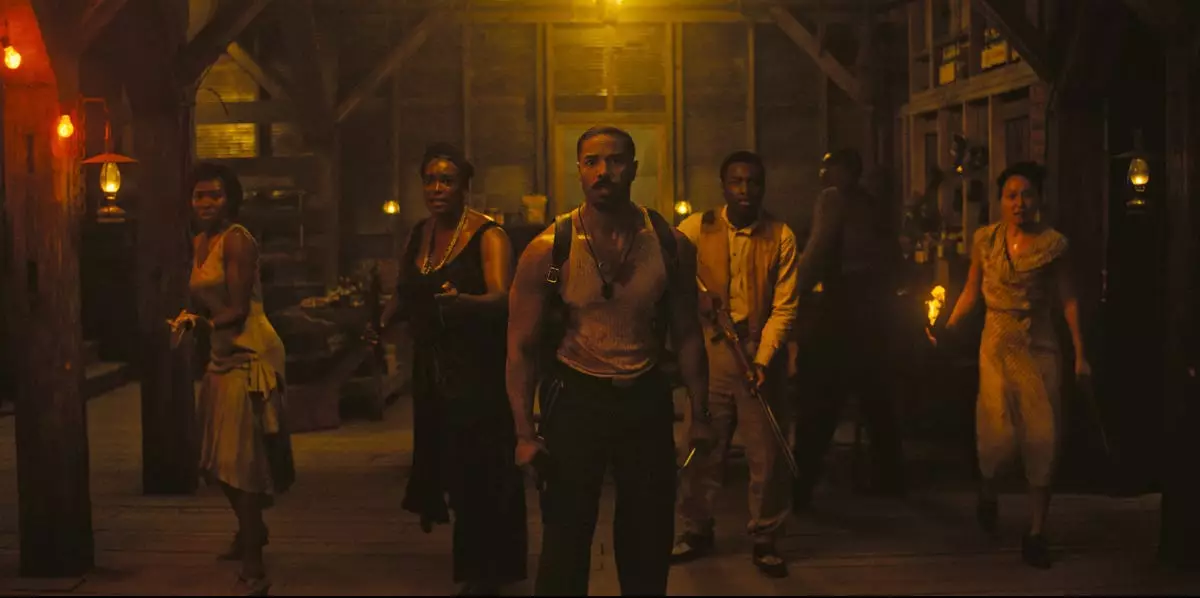Ryan Coogler, the masterful director known for impactful storytelling, takes a bold turn with his latest film, *Sinners*. Set against the haunting backdrop of 1930s Mississippi, this original vampire thriller dives deep not just into supernatural terror, but also into the intricate web of family, tradition, and the rich tapestry of Black Southern culture. After his triumphs with *Black Panther* and *Creed*, expectations run high for Coogler’s fifth collaboration with the talented Michael B. Jordan. In *Sinners*, Jordan showcases his versatility by portraying twin brothers, Smoke and Stack, who return home with the hope of escaping their troubled pasts, only to confront a nightmarish present filled with vampires and other fiendish creatures.
Despite its high-concept premise, *Sinners* does not settle for typical genre pitfalls. Instead, it evolves into an emotional exploration rooted in personal loss and familial legacy. Coogler’s narrative is enriched by his own experiences, particularly the loss of his uncle, James, a man who played a significant role in shaping Coogler’s identity. This personal element adds an authenticity that resonates deeply, making the film more than just another horror flick; it becomes a tribute to the memories that shape us, much like how Smoke and Stack grapple with their own familial histories.
Interplay of Horror and Humanity
What makes *Sinners* stand apart is its duality. As Coogler brings nightmares to life, he simultaneously infuses moments of humor and tenderness, reminding audiences that even in despair, life can find its lighter shades. This film embraces the complexity of Black existence, portraying themes of displacement, resilience, and community spirit in an evocative manner. Coogler himself noted a shift in perception during the filmmaking process, recognizing that the film should transcend a simple genre label and evolve into something monumental in scope.
This ambition translates visually through Coogler’s choice of cinematography; employing ultra-widescreen formats such as Ultra Panavision 70 and IMAX 65mm imparts an epic quality to the film. This decision aligns seamlessly with Coogler’s goal of creating a captivating theatrical experience, in which viewers leave feeling as though they’ve consumed a full meal rather than just a snack. His artistry reflects a commitment to the cinematic medium, aiming for fully immersive storytelling that captures both the grandeur and the intimate human experience intertwined within.
A Cultural Reflection
*Sinners* is not just a vampire movie; it encapsulates a cultural commentary on the African American journey through history—particularly in the South. The film deftly navigates the intersection between horror and historical context, offering commentary on the supernatural as a metaphor for real-world fears, anxieties, and the ghostly remnants of a painful past. In an era where Black narratives have often been relegated to the sidelines, Coogler’s work champions them, bringing forth stories that demand to be told—stories that echo with loss but also with an indomitable spirit of resistance.
Moreover, the resonance of family stories as a guiding thread is palpable in *Sinners*. As the twin brothers battle external demons, they also confront the internal struggles brought on by their lineage—a reflection that parallels the broader Black experience in America. The vampires symbolize more than mere monsters; they represent structured systems of oppression that have haunted communities for generations. Coogler masterfully intertwines personal and collective narratives, making the film a vessel for both escapism and critical reflection.
The Anticipation of the Arrival
As *Sinners* graces theaters, audiences are presented with an opportunity to engage deeply with themes that reverberate well beyond the screen. While Warner Bros. has yet to announce a streaming date for the film, anticipation is high for it to debut on Max, continuing the conversation surrounding the film long after its initial release. For now, eager viewers can scoop up access through platforms such as Prime Video and Apple TV+, further expanding the reach of Coogler’s captivating vision.
With *Sinners*, Ryan Coogler exemplifies a transformative artistic approach, pushing the boundaries of what genre films can achieve. The film serves not only as entertainment but also as a profound exploration of identity, memory, and perseverance in the face of darkness—traits that both haunt and inspire. In a world often dictated by fear and division, *Sinners* stands as a beacon of storytelling that connects past and present, illuminating the path forward.

